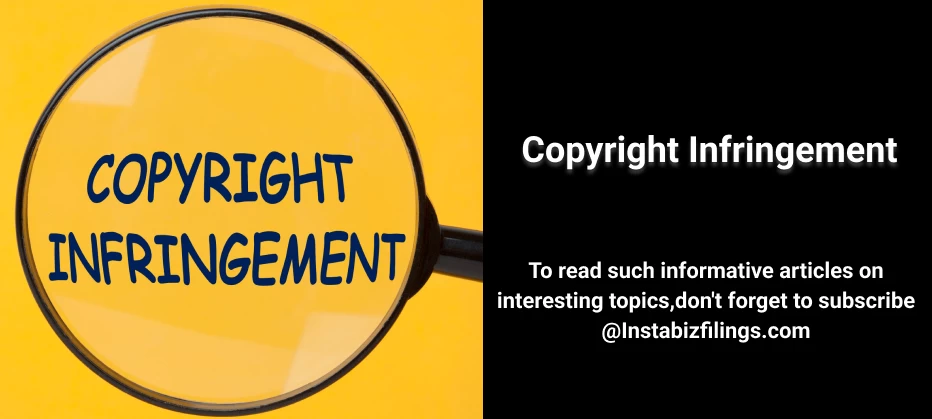
Copyright Infringement
October 13, 2025 by Team Instabizfilings
What Is Copyright Infringement?
Copyright infringement occurs when a copyrighted work is used without the permission of the copyright holder, violating the exclusive rights granted under copyright law. These rights typically include:
-
Reproduction: Copying the work.
-
Distribution: Selling or distributing copies.
-
Public Performance: Showing or playing the work publicly.
-
Derivative Works: Creating adaptations or transformations of the work.
Infringement can be intentional or accidental, and it applies to various forms of media, including literature, music, software, films, and digital content.
Copyright Law in India
India's copyright law is governed by the Copyright Act, 1957, which has been amended several times to address emerging issues, especially in the digital realm. Key aspects include:
-
Protection Duration: Copyright protection lasts for the lifetime of the author plus 60 years.
-
Registration: While not mandatory, registering a work with the Copyright Office provides legal advantages in case of disputes.
-
Infringement Penalties: Infringement can lead to civil and criminal penalties, including fines and imprisonment.
Recent developments include:
-
Digital Environment Protections: Amendments have been made to extend copyright protection in the digital environment, addressing issues like online piracy and unauthorised distribution of digital content.
-
Statute of Limitations: The period for filing a suit for infringement is three years from the date of infringement. If the infringement is ongoing, the limitation period starts from the date of the last infringement.
AI and Copyright: Emerging Challenges
The rise of Generative AI has introduced new complexities in copyright law. AI models can generate content that closely resembles existing copyrighted works, leading to potential infringement issues.
-
AI-Generated Content: Questions have arisen about whether works created by AI can be copyrighted and who holds the rights, the creator of the AI or the user prompting the AI.
-
Training Data: AI models are trained on vast datasets, which may include copyrighted material. The legality of using such data without explicit permission is a subject of ongoing legal debate.
In India, the government has established a panel to review copyright laws in light of these challenges, particularly concerning AI-generated content and unauthorised web scraping of publicly available data.
Enforcement and Remedies
Enforcement of copyright in India involves both civil and criminal remedies:
-
Civil Remedies: Include injunctions to stop the infringement, damages, and accounts of profits.
-
Criminal Remedies: In cases of willful infringement, penalties can include fines and imprisonment.
The Copyright Office of India plays a crucial role in the registration and protection of works, and it collaborates with law enforcement agencies to combat piracy and unauthorized use of copyrighted material.
Best Practices for Creators and Businesses
To protect your creative works and avoid infringing on others' rights:
-
Register Your Works: While not mandatory, registering your work provides legal advantages in case of disputes.
-
Use Licensed Content: Ensure that any third-party content used is properly licensed.
-
Implement Digital Rights Management (DRM): Use technology to control access to and distribution of your digital content.
-
Monitor Usage: Regularly check for unauthorised use of your works online.
-
Seek Legal Advice: Consult with an intellectual property lawyer to understand your rights and obligations.
Recent Developments
-
OpenAI's Sora 2 Controversy: OpenAI's new AI video generation app, Sora 2, faced backlash for generating videos featuring copyrighted characters without permission. In response, OpenAI announced plans to provide copyright holders with more detailed control over the use of their intellectual property in the app.
-
Hollywood and Bollywood Lobby for Stronger Protections: Industry groups from Hollywood and Bollywood are lobbying an Indian government panel to strengthen copyright protections against the use of their content in training artificial intelligence models.
Disclaimer
The information provided in this blog is purely for general informational purposes only. While every effort has been made to ensure the accuracy, reliability and completeness of the content presented, we make no representations or warranties of any kind, express or implied, for the same.
We expressly disclaim any and all liability for any loss, damage or injury arising from or in connection with the use of or reliance on this information. This includes, but is not limited to, any direct, indirect, incidental, consequential or punitive damage.
Further, we reserve the right to make changes to the content at any time without prior notice. For specific advice tailored to your situation, we request you to get in touch with us.

Need more details? We can help! Talk to our experts now!
Start Your Business Registration – Talk to Our Experts Now!

Still Confused?
Talk to experts? Fill in the information and we will reach out in 24 Working Hours.

